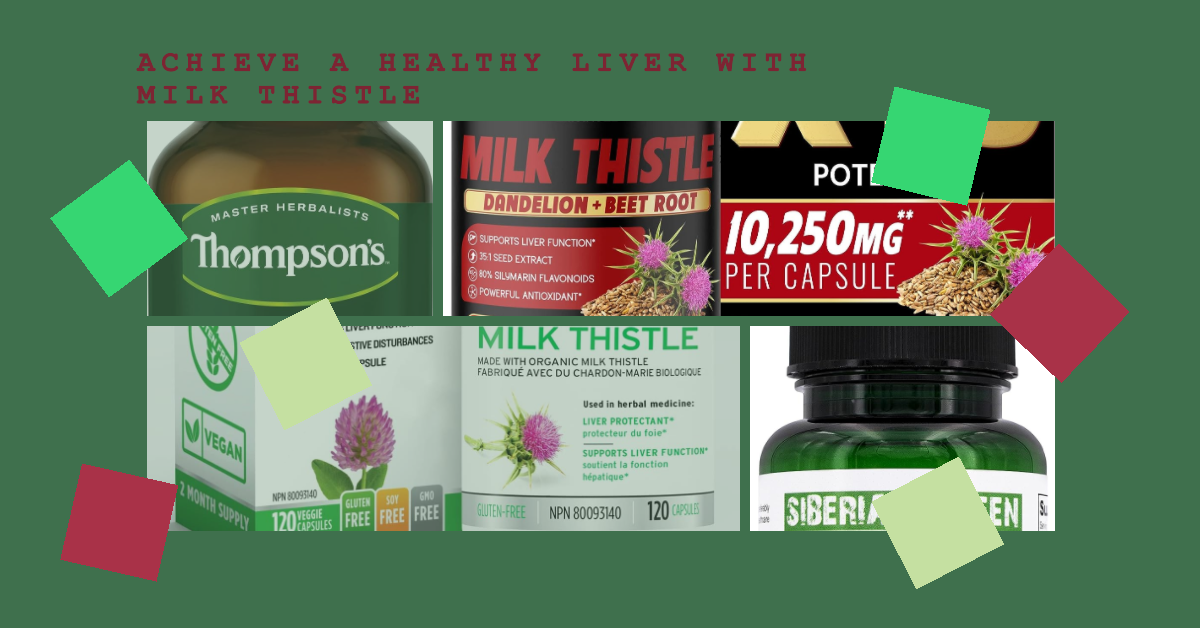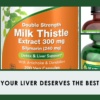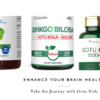Introduction
Milk thistle, renowned for its therapeutic benefits, aids in liver detoxification, supports liver functions, and acts as a potent antioxidant.
Dive deep into our top product recommendations to harness its benefits.This powerful herb has been used for centuries to support liver health and aid in detoxification.
With its active compound, silymarin, milk thistle helps protect the liver from damage caused by toxins and promotes its regeneration.
Whether you want to support your liver health or overcome specific liver-related issues, milk thistle may just be the solution you need. Discover the many benefits of milk thistle and take control of your liver’s health today.
What is Milk Thistle
Definition
Milk thistle, scientifically known as Silybum marianum, is a flowering plant that belongs to the daisy family. It is native to Mediterranean countries and is often recognized by its vibrant purple flowers and white veins. However, it is not just its beauty that makes milk thistle remarkable – the plant is renowned for its medicinal properties, particularly its ability to support liver health.
History and Traditional Use
Milk Thistle Capsules 10250 mg: Starting our list is this high potency supplement, enriched not only with milk thistle but also beetroot, cissus, and punarnava. Beetroot is known to help lower blood pressure, while cissus and punarnava can aid in weight loss and kidney health, respectively. When these ingredients are combined with milk thistle, the results are a comprehensive solution for your liver health. With a three-month supply, you can give your liver an extended treat.

Photo: Amazon
The use of milk thistle dates back thousands of years, with evidence of its medicinal applications found in ancient texts. The plant’s benefits for liver health have been well-documented throughout history, and it has played a significant role in traditional herbal medicine practices around the world. Milk thistle was highly valued by herbalists in ancient Greece and Rome, who recognized its ability to treat liver and gallbladder disorders.
Active Ingredients
The key active ingredients in milk thistle are a group of flavonoids called silymarin. Silymarin is a powerful antioxidant that is composed of several compounds, including silybin, silydianin, and silychristin. These compounds work together to provide milk thistle with its hepatoprotective, anti-inflammatory, and antioxidant properties. Silymarin is considered the primary pharmacological component responsible for milk thistle’s liver-protective effects.
Benefits of Milk Thistle for Liver Health
Protects Liver Cells
Milk thistle is known for its remarkable ability to protect liver cells from damage caused by toxins, oxidative stress, and inflammation. The silymarin in milk thistle has been found to strengthen the outer membrane of liver cells, preventing harmful substances from entering and causing damage. Additionally, silymarin stimulates the production of new liver cells, helping to replace damaged cells with healthy ones.
Promotes Liver Regeneration
One of the key benefits of milk thistle is its ability to promote liver regeneration. Liver cells are constantly exposed to various insults that can compromise their ability to function optimally. Milk thistle supports the liver’s natural regenerative processes, helping to stimulate the growth and repair of liver tissue. This can be especially beneficial for individuals with liver conditions or those who have been exposed to toxins that may have caused liver damage.
Detoxifies the Liver
Another important role that milk thistle plays in liver health is its ability to support the liver’s detoxification processes. The liver is responsible for breaking down and eliminating toxins from the body, and milk thistle helps to enhance these crucial functions. By aiding in the detoxification process, milk thistle can help reduce the burden on the liver and optimize its ability to eliminate harmful substances from the body.
Reduces Inflammation
Inflammation in the liver can lead to various liver conditions and hinder its ability to function properly. Milk thistle has been shown to possess anti-inflammatory properties, which can help reduce inflammation in the liver. The anti-inflammatory effects of milk thistle may help alleviate symptoms associated with liver diseases and promote overall liver health.
Boosts Antioxidant Activity
Oxidative stress is a significant contributor to liver damage and is often seen in individuals with liver diseases. Milk thistle’s silymarin content acts as a potent antioxidant, helping to neutralize free radicals and protect liver cells from oxidative damage. By boosting antioxidant activity, milk thistle can help prevent the progression of liver diseases and maintain liver health.
Renew Actives Milk Thistle Capsules: These capsules contain 175mg of organic milk thistle seed extract, a concentrated dose to ensure you get the best of what milk thistle has to offer. The formula is also standardized with silymarin, an antioxidant that boosts liver health. Encased in veggie pills, this supplement is suitable for vegetarians as well.

Photo: Amazon
Research and Evidence
Studies on Milk Thistle and Liver Diseases
Numerous studies have been conducted to explore the effects of milk thistle on liver diseases. A review of several clinical trials found that milk thistle supplementation improved liver function and reduced liver inflammation in individuals with liver diseases such as alcoholic liver disease, non-alcoholic fatty liver disease, and viral hepatitis. Another study on individuals with liver cirrhosis found that milk thistle supplementation significantly improved liver enzymes and overall liver function.
Effectiveness and Safety
Milk thistle is generally considered safe for most individuals when taken as directed. Adverse effects are rare but can include mild digestive issues such as upset stomach or diarrhea. It is important to note that milk thistle may interact with certain medications, such as anticoagulants and antipsychotics, so it is crucial to consult with a healthcare professional before starting any new supplement regimen.
Recommended Dosage
The dosage of milk thistle can vary depending on factors such as the individual’s age, weight, and overall health. It is recommended to follow the dosage instructions provided on the specific milk thistle supplement you choose, as formulations can vary. Typically, a recommended dosage for milk thistle extract ranges between 200-400 mg per day, divided into two or three doses.
Conditions that Milk Thistle Can Help
Fatty Liver Disease
Milk thistle has been shown to be beneficial for individuals with fatty liver disease, a condition characterized by the accumulation of fat in the liver. The antioxidant and anti-inflammatory properties of milk thistle may help reduce liver inflammation and improve liver function in individuals with this condition.
Alcoholic Hepatitis
Alcoholic hepatitis is a serious liver condition caused by excessive alcohol consumption. Studies have shown that milk thistle may help protect the liver from alcohol-induced damage and support the regeneration of liver cells, potentially improving outcomes for individuals with alcoholic hepatitis.
Herbal Liver Detox with Milk Thistle: Venturing away from milk thistle alone, this supplement combines the power of artichoke and dandelion, which are both known to enhance liver detoxification. Drawing on a traditional Siberian formula, it provides a holistic approach to liver wellness.

Photo: Amazon
Cirrhosis
Cirrhosis is a late stage of liver disease characterized by scarring and permanent damage to the liver. Milk thistle has been studied for its potential benefits in individuals with cirrhosis, with some research suggesting that it may improve liver function and quality of life in these individuals.
Hepatitis B and C
Hepatitis B and C are viral infections that can cause liver inflammation and damage. Studies have shown that milk thistle may help reduce liver inflammation in individuals with chronic hepatitis B or C, potentially slowing the progression of the diseases and improving liver health.
Non-Alcoholic Steatohepatitis (NASH)
Non-alcoholic steatohepatitis (NASH) is a form of fatty liver disease that occurs in individuals who do not consume excessive alcohol. Research suggests that milk thistle may have a positive impact on NASH by reducing liver inflammation and improving liver function.
Different Forms of Milk Thistle Supplements
Standardized Extracts
Standardized milk thistle extracts contain a specific concentration of silymarin, usually around 70-80%. These extracts are derived from the seeds of the milk thistle plant and are the most common form of milk thistle supplements available.
Silymarin Phosphatidylcholine Complex
Silymarin phosphatidylcholine complex is a form of milk thistle supplement that combines silymarin with phosphatidylcholine, a compound found in cell membranes. This complex is believed to enhance the absorption and bioavailability of silymarin, potentially improving its effectiveness.
Milk Thistle Tea
Milk thistle tea is made by steeping milk thistle seeds in hot water. This form of milk thistle allows for a more natural and traditional way of consuming the herb. However, it is important to note that the concentration of active compounds in milk thistle tea may vary.
Any Questions🤔?
Reach out to us! We’re here to clarify and prioritize your well-being. 🌟
Milk Thistle Oil
Milk thistle oil is derived from the seeds of the milk thistle plant through a cold-pressing process. It is rich in antioxidants and can be consumed orally or applied topically. Milk thistle oil is often used for its skin-nourishing properties but may also provide some benefits for liver health.
Other Dietary Supplements
Milk thistle may also be found as an ingredient in various multi-ingredient dietary supplements designed to support liver health. These supplements often combine milk thistle with other liver-supportive herbs, vitamins, and minerals to provide a comprehensive approach to liver care.
How to Choose a High-Quality Milk Thistle Supplement
Look for Standardization and Certification
When selecting a milk thistle supplement, it is important to look for products that are standardized to contain a specific percentage of silymarin. Standardization ensures that the supplement provides a consistent amount of the active compounds. Additionally, choosing a product that is certified by a reputable third-party organization can provide assurance of its quality and purity.
Check the Concentration of Silymarin
The concentration of silymarin in milk thistle supplements can vary, so it is important to check the product label for this information. Look for products that contain a sufficient amount of silymarin, preferably around 70-80%, as this is commonly considered an effective dosage range.
Thompson’s One-a-day Milk Thistle 42000mg: If you’re after potency, look no further. With a whopping 42000mg of milk thistle, it ensures you get a healthy dose of the herb every day. It aids in detoxification and acts as a potent antioxidant, ensuring your liver gets all the care it needs.

Photo: Amazon
Consider the Form and Delivery Method
Consider your personal preferences and needs when selecting a milk thistle supplement. If you prefer capsules or tablets, opt for standardized extract forms. If you enjoy herbal teas, milk thistle tea may be a suitable choice. For those looking for a versatile option, milk thistle oil can be used both internally and externally.
Read User Reviews and Ratings
Before making a final decision, it can be helpful to read user reviews and ratings of different milk thistle supplements. This can provide insights into the experiences of other individuals who have used the product and help you make an informed decision.
Possible Side Effects and Precautions
Allergic Reactions
While rare, some individuals may experience allergic reactions to milk thistle supplements. Symptoms may include rash, itching, swelling, or difficulty breathing. If you experience any of these symptoms, discontinue use immediately and seek medical attention.
Digestive Issues
Milk thistle is generally well-tolerated, but some individuals may experience mild digestive issues such as an upset stomach, bloating, or diarrhea. If these symptoms occur, it is best to reduce the dosage or discontinue use.
Interactions with Medications
Milk thistle may interact with certain medications, including anticoagulants, antipsychotics, and anti-seizure medications. It is important to consult with a healthcare professional before starting milk thistle supplementation, especially if you are taking any medications.
Not Suitable for Pregnant or Breastfeeding Women
Due to limited safety data, it is not recommended for pregnant or breastfeeding women to use milk thistle supplements. It is always best to consult with a healthcare professional before taking any supplements during pregnancy or while breastfeeding.
Tips for Using Milk Thistle
Consult with a Healthcare Professional
Before incorporating milk thistle into your healthcare regimen, it is advisable to consult with a qualified healthcare professional. They can provide guidance tailored to your specific health needs and help determine if milk thistle is suitable for you.
Follow Recommended Dosage
Always adhere to the recommended dosage instructions provided with your chosen milk thistle supplement. Taking more than the recommended dosage may not provide additional benefits and could increase the risk of side effects.
Take with Meals
To enhance absorption and minimize the risk of digestive issues, it is generally recommended to take milk thistle supplements with meals. This can help ensure proper absorption of the active compounds and improve overall tolerance.
Consider Long-Term Use
Milk thistle is often used as a long-term supplement to support liver health. For optimal results, it is advisable to incorporate milk thistle into your daily routine consistently over a sustained period of time.
Combine with a Healthy Lifestyle
While milk thistle can be beneficial for liver health, it is essential to remember that it is not a substitute for a healthy lifestyle. To achieve and maintain optimal liver health, it is important to follow a balanced diet, engage in regular exercise, and avoid excessive alcohol consumption and toxin exposure.
FAQ (Frequently Asked Question)
Q: What are the primary benefits of Milk Thistle?
A: Milk Thistle is renowned for supporting healthy liver function, detoxification, and acting as an antioxidant.
Q: How often should I consume these supplements?
A: It’s recommended to follow the dosage on the product label or consult a healthcare professional.
Q: Are there any side effects of Milk Thistle supplements?
A: Generally safe, some might experience minor digestive issues. Always consult with a healthcare professional before starting any supplement.
Q: Can I combine Milk Thistle with other medications?
A: Always consult a healthcare provider before combining supplements with medications due to potential interactions.
Q: What makes milk thistle supplements different from each other?
A: Different supplements might have varying potency, additional ingredients, or be based on different extraction methods.
Conclusion
Milk thistle is a potent herbal remedy that has been used for centuries to support liver health. With its hepatoprotective, anti-inflammatory, and antioxidant properties, milk thistle offers numerous benefits to individuals with various liver conditions. From protecting liver cells to promoting liver regeneration and detoxification, milk thistle has proven to be a valuable ally in achieving a healthy liver. When choosing a milk thistle supplement, remember to consider factors such as standardization, concentration of silymarin, and form of delivery. As with any supplement, it is important to consult with a healthcare professional and follow recommended dosage guidelines. By incorporating milk thistle into your daily routine and combining it with a healthy lifestyle, you can take proactive steps towards achieving optimal liver health.
References
- Abenavoli L, Milic N, Greco M, et al. Effects of Milk Thistle in the Treatment of Liver Diseases: A Systematic Review and Meta-analysis of Randomized Controlled Trials. J Clin Gastroenterol. 2017;51(3):e22-e32.
- Hałasa M, Maciejewska-Markiewicz D, Sałaga M, et al. The influence of DHA-rich fish oil supplementation on the level of sertoli cell hormones and oxidative stress in rats with induced ischemia of the testis. Biomed Res Int. 2015;2015:978615.
- Manna SK, Mukhopadhyay A, Van NT, Aggarwal BB. Silymarin suppresses TNF-induced activation of NF-kappa B, c-Jun N-terminal kinase, and apoptosis. J Immunol. 1999;163(12):6800-6809.
- Recknagel RO, Glende EA Jr, Dolak JA, Waller RL. Mechanisms of carbon tetrachloride toxicity. Pharmacol Ther. 1989;43(1):139-154.
- Singal AK, Jampana SC, Weinman SA. Antioxidants as Therapeutic Agents for Liver Disease. Liver Int. 2011;31(10):1432-1448.
Disclaimer
Please keep in mind that nothing said here should be construed as a substitute for professional medical or financial advice from a qualified financial advisor or a licensed healthcare provider. If you use pharmaceuticals or have concerns after reading the above review information, be sure to speak with a qualified physician or financial expert before making any purchasing decisions. Since the claims made about these products have not been reviewed by the Food and Drug Administration or Health Canada, individual outcomes may differ and cannot be guaranteed. Research that has been approved by the FDA or Health Canada has not attested to the efficacy of these products. These goods do not offer any form of get-rich-quick scheme and are not designed to diagnose, treat, cure, or prevent any ailment. The reviewer disclaims all liability for incorrect pricing. For exact prices, view the product sales page



